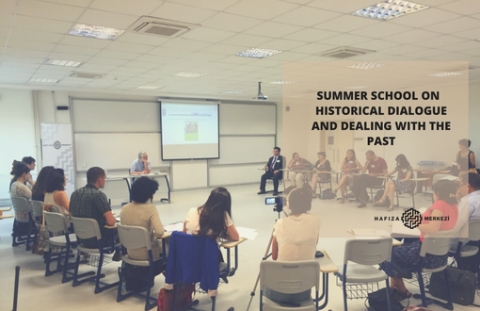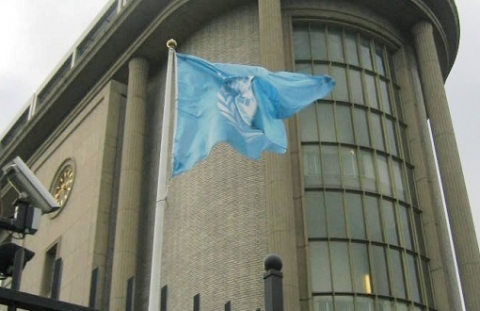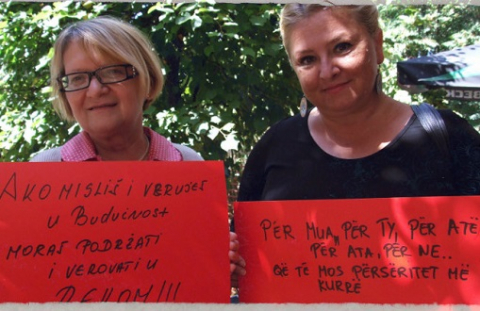
Mario Mažić*
Vukovar is a town in the far east of Croatia. Before the 1990s war, it was known as a multicultural, multiethnic community with around 46.000 citizens. It was also one of three economically most developed towns in Croatia and among the most prosperous in Yugoslavia.
I personally grew up watching, daily, the images of the famous water tower in Vukovar and the face of a young girl refugee from Vukovar. When I was in an Austrian hotel that welcomed refugees from former Yugoslavia, I remember how people form Vukovar almost had a special status; they were the ‘stars among the victims’.
Unlike the rest of Croatia that was integrated by military actions in 1995, Vukovar and surrounding areas were integrated through a UN-led effort of peaceful reintegration.
Today, Vukovar has around 27.000 citizens and is still very much multiethnic, but not really multicultural.
My young friends from Vukovar often say that they respect the victims, but don’t like living in a symbol. They would rather live in a town that gives them a sense of normal life – something they never had growing up.
Today, another generation is being raised in this symbol. In Vukovar, tomorrow never comes. It is always yesterday. Or rather a few years ago.
In July this year, Croatia became a member state of the European Union after long and comprehensive negotiation process. The negotiating chapters dealing with judiciary and fundamental rights (Chapter 23) and justice freedom and security (Chapter 24) were among especially important ones, having in mind Croatia’s recent authoritarian and conflict history.
Many reforms dealing with human rights issues have been implemented to meet the criteria of the EU in these chapters. Some of the most important reforms in that respect were dealing with the protection of rights of national minorities, especially the Serbs that are still widely considered enemies of the Croatian state by the nationalists in the country.
Social and political rights such as political representation, use of mother tongue and the whole set of citizenship rights were among those affected by the reforms, as they are the backbone of a democratic society.
The population census from 2011 showed that over 1/3 of population in Vukovar is ethnic Serbs.
According to international human rights documents such as the Framework Convention on Rights of National Minorities of the Council of Europe as well as the Croatian Constitution and the Constitutional Law on Minority Rights; minorities, if they comprise over 1/3 of population have a set of rights. These rights include equal use of their mother tongue before the institutions and in the public.
Croatia has been familiar with this situation for years. In Istria, the largest Croatian peninsula in northwest, there are numerous towns where Croatian and Italian are in equal use. The street names, titles of institutions and official documentation of local (municipal) governments are in both Croatian and Italian.
However, in Vukovar, this caused significant unrest. Soon after the part of Serbs in Croatia filed for these rights, a nationalistic initiative titled The Committee for the Defense of Croatian Vukovar was established.
As soon as the titles of institutions were put in Croatian and Serbian (Latin and Cyrillic), the protests started and the titles were removed violently, with hammers. Explanation offered by the protesters: dignity of victims.
Apparently, they seem to think that it is against the dignity of victims to have Serbian in equal use.
Since it is about Vukovar, this is not a local issue. The gravity of Vukovar symbolism made it into a national and even an international problem.
The central Government in Zagreb insisted that the titles of institutions be put in both languages. It did so a few times, with the help from the police. We just became a member state of the EU and should not compromise about minority rights. At least not right away.
Another issue is that the current Government is a social-democrat and liberal coalition. They have to prove their patriotism. Or at least they have a feeling they do.
Therefore, the nationalist and vandalistic Committee did not meet the reaction they should have been met with: which would have been criminal complaints against those who violently broke the titles of the institutions.
Rather, the Minister of Defenders (yes, this is how it’s called!) entered into a very public discussion with them. Later, the Prime Minister went to Vukovar to meet with their leaders. A few times.
Finally, there will be one commemoration. They call it unity. I disagree and think it should rather be called uniformity. This commemoration will not go through a multicultural, multiethnic Vukovar from the beginning of this text. It will go through the Croatian Vukovar.
Nationalism that these groups promote today, and that our institutions legitimize by meeting them is equal to the nationalism that was promoted by those who committed the crimes. These nationalists of today are as much the enemies of multicultural and multiethnic Vukovar as the nationalists that destroyed 2/3 of the buildings in it in 1991.
Regardless of the wrapping it comes in; be it Croatian, Serbian, Bosnian, Albanian, Turkish, German, or Greek: nationalism is always an enemy of diversity, an enemy of democracy and an enemy of peace.
Background
Between September and November 1991, Vukovar suffered violent combat that caused virtually all ethnic Croats to flee and left three quarters of buildings in ruins. Several groups of crimes soon became symbols of the Croatian war of independence, or, as is called in Croatia – The Homeland War. Later, the town itself became a symbol of war and struggle, a symbol of aggression of Serbian and JNA (Yugoslav People’s Army) forces on Croatia.
The ICTY alone dealt with crimes committed in Vukovar against Croat civilian population in several cases. The ICTY Office of the Prosecutor also investigated crimes committed by the Croatian forces in the summer of 1991 and delivered that documentation to the domestic Croatian institutions, but they never wanted to touch it. In 2010, the Youth Initiative for Human Rights also researched some of these crimes and delivered the documentation to the State Attorney’s Office, but met total ignorance as well. These crimes cannot be touched. If touched, they will question the sole fundaments of the dominant narrative. Some believe that it might compromise the symbol status of Vukovar and even be used as justification for the later aggression. Like anything could ever justify the crimes of such gravity, or any crimes against civilians for that matter. But, nationalism and nationalist narratives would not exist in the first place if they relied on common sense would they?
*Mario Mažić is the Director of Programs of the Youth Initiative for Human Rights in Croatia.



